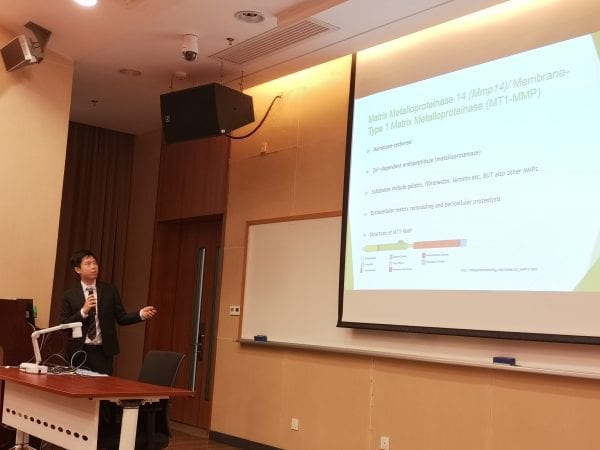
oznor
| Talk title | Targeting MT1-MMP: Therapeutic Opportunities in Obesity, Type 2 Diabetes and Other Associated Diseases |
| Speaker | Prof. Hoi Leong Xavier WONG Research Assistant Professor School of Chinese Medicine, Hong Kong Baptist University |
| Date & Time | 17 Sep 2019 (Tue) 11:00-12:00 |
| Venue | Room G004, E12 Building (University of Macau) |
| Abstract | Obesity and diabetes are major causes of morbidity and mortality. Obesity is known to be the main risk factor for various non-communicable diseases, in particular type 2 diabetes. There is an ongoing need to identify non-invasive therapeutic approaches for the management of obese patients with type 2 diabetes to achieve their glycemic and weight loss goals.
Recently, mutations in MT1-MMP (MMP14), a membrane bound metalloproteinase responsible for extracellular matrix remodeling and pericellular proteolysis, have been associated with human obese and diabetic traits. In this talk, the role of MT1-MMP in energy and glucose homeostasis and the molecular mechanism by which MT1-MMP regulates body weight and insulin sensitivity will be discussed. Here we show that MT1-MMP contributes to the development of metabolic disorders through increasing energy intake and impairing insulin sensitivity. Obesity increases the expression of MT1-MMP systematically. Ectopic expression of MT1-MMP in mouse liver induces insulin resistance in regular chow-fed mice. Conversely, inhibition of MT1-MMP activities by either genetic knockout or pharmacological approaches leads to the weight loss along with improved insulin sensitivity in both young mice with high-fat-diet induced obesity and aged mice fed with regular chow diet. Mechanistically, we found that MT1-MMP is a suppressor for GDF15-GFRAL signaling pathway, a newly identified central nervous system circuit that regulates metabolism and food intake in response to stress. In addition, MT1-MMP also impairs insulin signaling in the control of peripheral insulin sensitivity and glucose metabolism. These results indicate that MT1-MMP constitutes an important modulator of insulin sensitivity and energy homeostasis. Thus, targeting MT1-MMP represents potential therapeutics for the management of obesity and type 2 diabetes, two diseases with a need for combined treatment strategies. |

